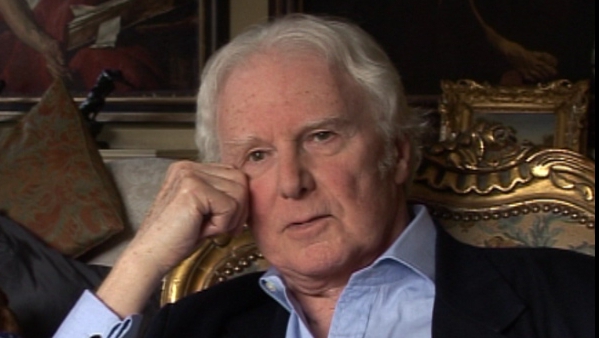NEXT STORY

Travel experience you wouldn't get today
RELATED STORIES

NEXT STORY

Travel experience you wouldn't get today
RELATED STORIES


|
Views | Duration | |
|---|---|---|---|
| 41. Being a 'poofter' in the army | 342 | 02:23 | |
| 42. What I discovered on my 'duty dog' patrol | 267 | 03:05 | |
| 43. Punished for being too modest | 251 | 03:58 | |
| 44. The social benefits of National Service | 223 | 03:37 | |
| 45. Making the most of army furlough | 199 | 03:05 | |
| 46. My second stint at The Courtauld | 207 | 03:56 | |
| 47. A road-trip from England to Italy | 238 | 05:50 | |
| 48. Travel experience you wouldn't get today | 242 | 05:28 | |
| 49. A moment of pure unalloyed happiness | 260 | 05:07 | |
| 50. Just good friends, doing what good friends do | 219 | 07:28 |


For me, The Courtauld was almost a monkish experience. I went to The Courtauld really not at all sure what I was going to do with the degree, if and when I got it. And when I came away from The Courtauld, there was nothing I wanted to do except be an art historian in some sense. So it was, I think, as a result of that extraordinary concentration, unrelenting, that I became what I am. And it was… rather like your earlier question, what did I do for fun? There wasn’t any fun. Whatever fun there was was Courtauld fun. Fun was getting in the car – because I’d bought a car by then – and gallivanting off to look at a country house or a provincial museum or Dulwich, even, usually with two or three other students sharing the petrol costs and so on.
And in the very first, sort of, long break in the first year, at Easter, six of us crammed into a car and went off to Rome and took a month doing it. And in those days, of course, there were no motorways, and so you trundled along at 45 miles an hour and stopped whenever you saw anything that looked interesting, because roads, in those days, went through towns. Now roads just go through the countryside, you’re cut off from reality. Whereas if you’re going anywhere near Reims, for example, you used, in the old days, to have to go through it. So stopping to look at the cathedral was the automatic thing to do. And you could… you’re trundling along at this slow speed and look out of the window and you see something wonderful on a hill over, you… 'What’s that?' The hurried, sort of, inspection of the map and it’s identified as something. 'Oh, well let’s go, let’s go'. And so it was a very, very leisurely movement south, looking at things all the time. Not necessarily things that were part of our chosen syllabus, but we had that wonderful sense of curiosity, that everything was grist to our mill, that made sort of stopping to look at a wayside church well worthwhile. And we eventually got to Florence and we had extraordinary good fortune. You’d turn up in Florence and find an hotel which was run by a family called Bruggi, Familia Bruggi, and they had the first floor of what had been a palazzo in the Piazza Santa Maria Novella.
There were shops below, and you went through a rather little side door and up a staircase, and there on the first floor, was this pensione. And we were six, and they said, 'Oh, gosh, yes, well, how would you like to have our grande salone?' And they put four beds for the boys in the grande salone and put the two girls in a smaller room. And they all went and lived in the kitchen. And we had a lovely time, because we had these beautiful painted ceilings and frescoed walls, windows on to the piazza, a wonderful church with wonderful things in it, 50 yards away up the road and so on. Walked everywhere, saw everything. And one of the advantages of being in a small group of six, is that you can all exchange material, an idea, an observation and so on, and if you don’t all want to do the thing, you break up into pairs or trios and so on, and then come together elsewhere.
And we ate like mice and spent no money and drifted down to Bologna and Orvieto and Siena and so on. And then, on the way back, went to Venice and it was non-stop looking. But you can’t do that now. There is nowhere in Italy where you can turn up and just knock on a door, but you could, then. And I think this is a great shame. And it’s partly to do with motorways, and it’s partly to do with the enormous increase in traffic and tourism and so on.
Born in England, Brian Sewell (1931-2015) was considered to be one of Britain’s most prominent and outspoken art critics. He was educated at the Courtauld Institute of Art and subsequently became an art critic for the London Evening Standard; he received numerous awards for his work in journalism. Sewell also presented several television documentaries, including an arts travelogue called The Naked Pilgrim in 2003. He talked candidly about the prejudice he endured because of his sexuality.
Title: A road-trip from England to Italy
Listeners: Christopher Sykes
Christopher Sykes is an independent documentary producer who has made a number of films about science and scientists for BBC TV, Channel Four, and PBS.
Tags: Italy, The Courtauld Institute of Art, Dulwich Picture Gallery, Florence, Riems, Venice, Bologna, Orvieto, Siena, Rome, Piazza Santa Maria Novella
Duration: 5 minutes, 50 seconds
Date story recorded: April 2013
Date story went live: 04 July 2013